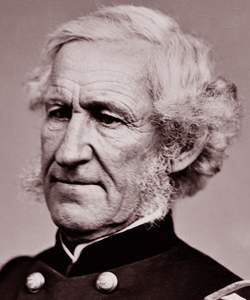Lorenzo Thomas (American National Biography)
Scholarship
Anxious to speed the enlistment of African Americans into the armed forces in accordance with the terms of the recent Emancipation Proclamation, Stanton ordered Thomas to the Mississippi Valley in the spring of 1863 to inaugurate the first large-scale War Department effort at black recruitment. Traveling through Kentucky, Arkansas, Louisiana, Mississippi, and Tennessee, Thomas arranged for existing army divisions to organize African-American regiments composed chiefly of erstwhile slaves. A Bureau for Colored Troops was quickly established under Thomas. Precisely because he was not known as an abolitionist or a Radical and because he pitched his appeals to white soldiers' self-interest, he was able to weaken the resistance of military men to the incorporation of "contrabands" into the service. Though he opposed allowing African Americans to serve as officers in the new regiments, Thomas at the same time insisted that black troops not be forced to perform any disproportionate share of fatigue duty. He also endeavored to provide for the families of black recruits and other fugitive slaves by establishing a system by which they worked for wages on abandoned plantations that were leased to northern entrepreneurs or southern loyalists. While this leasing system did not become as widespread as Thomas had hoped, his successes in raising troops were undeniable. Lincoln wrote, "The evidence is nearly conclusive that General Thomas is one of the best (if not the very best) instruments for this service" (Cornish, p. 126). By the war's end Thomas had overseen the recruitment of over 76,000 African Americans, more than 40 percent of the black soldiers who wore the blue. He was brevetted major general in March 1865.
Edward Hagerman, "Thomas, Lorenzo," American National Biography Online, February 2000, http://www.anb.org/articles/04/04-00984.html.



